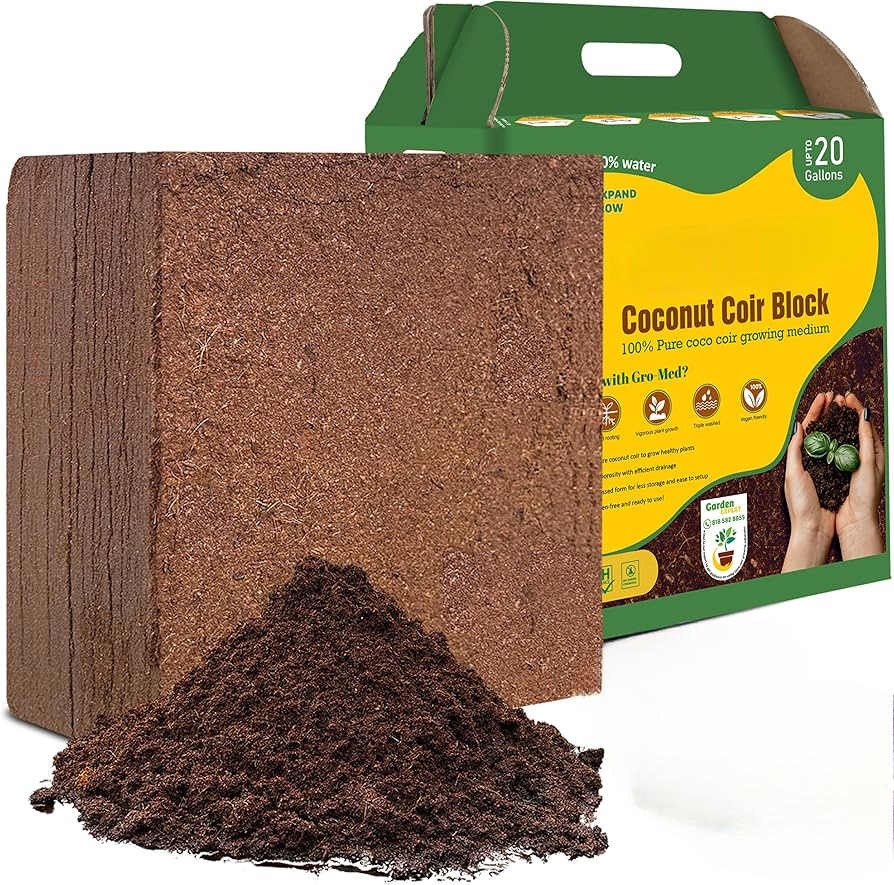Description
1. Material Composition:
- Primary Material: Coir pith is the soft, spongy residue left after extracting the long fibers from the coconut husk. It is fine, light in texture, and highly absorbent.
- Form: Coir pith is processed into compressed blocks for ease of transportation and storage. When rehydrated, it expands significantly.
- Particle Size: The pith is typically ground into fine particles, with sizes ranging from 1 mm to 10 mm in diameter.
2. Physical Properties:
- Compression: The blocks are tightly compressed for easy packaging, and they expand significantly once rehydrated with water.
- Block Size:
- Typical sizes of compressed blocks are 5 kg, 10 kg, and 25 kg, but can vary based on the manufacturer.
- Upon rehydration, a 5 kg block typically expands to 60-80 liters of loose material.
- Bulk Density: Coir pith blocks have a bulk density of around 0.1–0.2 g/cm³, depending on the compression and moisture content.
- Moisture Content: Coir pith blocks typically have around 10-20% moisture when packed, though this can vary depending on storage conditions.
3. Chemical Properties:
- pH Level: Coir pith generally has a neutral to slightly acidic pH, typically ranging between 5.5 and 6.5. This pH range is suitable for a wide variety of plants.
- Electrical Conductivity (EC): Coir pith has a low electrical conductivity, which indicates a low level of soluble salts. This is important for avoiding excess salts that could harm sensitive plants.
- Nutrient Content: While coir pith itself is not rich in nutrients, it acts as an excellent medium for nutrient retention and release, especially when combined with fertilizers.
- Cation Exchange Capacity (CEC): Coir pith has a high CEC, which allows it to retain and exchange nutrients, making it beneficial in improving soil fertility.
4. Physical Performance:
- Water Retention: Coir pith is highly water-absorbent, holding 8-10 times its weight in water. It helps maintain consistent moisture levels around plant roots.
- Aeration: The structure of coir pith provides good aeration for roots, reducing the chances of root rot and encouraging healthy root development.
- Drainage: Despite its water retention ability, coir pith also offers good drainage due to its fibrous structure, ensuring that water doesn’t stagnate.
- Biodegradability: Coir pith is biodegradable and decomposes over time, enriching the soil with organic matter.
5. Sustainability:
- Renewable Resource: Coir pith is a byproduct of coconut processing and is a renewable, eco-friendly material, making it a sustainable alternative to peat moss.
- Low Environmental Impact: The production of coir pith has a relatively low environmental impact, as it is processed with minimal chemicals and makes use of waste material from coconut farming.
6. Applications:
- Horticulture: Coir pith is used as a soil amendment or growing medium in various applications such as seed starting, potting mixes, and container gardening.
- Hydroponics: It is commonly used in hydroponic systems due to its excellent water retention and aeration properties.
- Soil Conditioner: It improves soil structure by enhancing moisture retention, drainage, and aeration in garden soils.
- Mulching: Coir pith can be used as mulch in gardens to retain moisture, suppress weeds, and regulate soil temperature.
- Composting: It can be added to compost piles to help aerate the compost and retain moisture.
7. Packaging and Storage:
- Packaging: Coir pith is typically packed into plastic bags or wrapped in netting before being compressed into blocks. These blocks are then shrink-wrapped or packaged to prevent moisture loss.
- Storage: Store in a cool, dry place to avoid the risk of mold or degradation. Coir pith should be kept away from direct sunlight, which can dry it out.
Specifications
5kg Low EC Coco pith Block
- Weight:5 Kg +/- 200 gm
- Size:30 x 30 x 12 cm
- Compression ratio:5:1
- Moisture content:less than 20%
- Electrical conductivity:less than 0.7 mS/cm
- Expanded volume:14 to 15 liters per kg
- Packing: 219 blocks per pallet
- Load ability:20 pallets / 22 M.Ton in one 40 feet HC container











Reviews
There are no reviews yet.